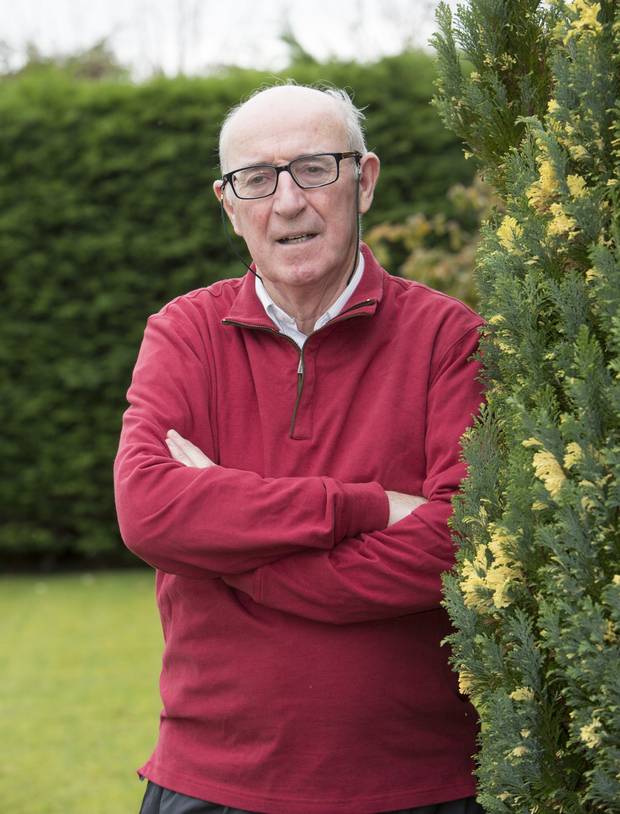
Tom O’Donoghue will tell you that he’s “one of the lucky ones”. And he was lucky, says the Tipperary GAA fan and retired second-level teacher, because it was quite by accident that he discovered he had a rare cancer, a Neuroendocrine Tumour (NET).
NET cancers are rare – only about 2,000 people in this country have been diagnosed with these conditions.
NETs are also often called the ‘quiet cancers’ because they are often slow growing. Symptoms can take time to develop, and may be vague, or even attributed to more common and less serious problems, such as irritable bowel syndrome.
The 72-year-old former GAA coach from Greenrath, who lives a short distance from the town of Tipperary, discovered that he had a NET cancer in his liver when he consulted his GP in 2007 about his plans to retire from his job teaching English and Geography.
Three years previously, in 2004, Tom had surgery for a detached retina which left him with vision problems.
“The treatment left me with a weak left eye, and by 2007 I decided I had to retire because I was having both blurred vision and double vision, all of which was making it difficult for me to work as a teacher.”
Tom went to see his GP to discuss the situation.
His doctor started to ask questions.
“He asked me when the vision problems happened,” recalls Tom.
“I said that it happened when I got tired.
“Then he asked if I got tired often. I said I experienced fatigue quite a lot.”
Next his doctor wanted to know if Tom had lost weight or was experiencing diarrhoea or bowel problems. Again, the answer was yes.
“I was referred for a colonoscopy and a gastroscopy and I also had an ultrasound of my liver,” he recalls.
He had the tests in June 2007. The results were worrying. The ultrasound scan revealed the existence of lesions on Tom’s liver.
“I had actually thought I was retiring because my vision was bad, but now I had discovered that there was something wrong with my liver.
“I knew I was in trouble,” he says now.
It took until the end of July to pinpoint what kind of cancer Tom had.
On discovering that he was diagnosed with a NETs condition, it was decided that Tom needed to travel to Uppsala in Sweden for treatment.
Although part of this treatment required surgery, which could have been carried out in Ireland, Tom also required a procedure called Radio Frequency Ablation, which at that time was not available in this country (it is available now). Tom had the first part of his surgery in Uppsala in November 2007. He returned to Sweden in January 2008 for the Radio Frequency Ablation.
“I went back to Uppsala three times over 2008,” he recalls.
Between then and the autumn of 2011, the former teacher returned to Uppsala every six months for a check-up. Since 2011 Tom has regularly attended the Centre of Excellence for NETs at St Vincent’s Hospital, Dublin, where he is monitored every nine months.
Last May, however, the pensioner received further worrying news – his cancer had spread.
“However, the good news was that it is low volume and is treatable,” Tom observes.
Next March he is due to undergo another series of tests. Once the results are available, he explains, a decision will be made as to whether he requires further treatment.
In the meantime, he feels well, although fatigue remains a major problem.
“I now have to take regular rest periods during the day and I have to avoid GAA matches because I get too excited while I’m watching the game – and I’m supposed to avoid any form of stress! I know some people would say ‘why me?'” he observes.
“I would say, ‘why not me?’ I believe in living the best I can with the time I have. I live in the now. I pray to have a good attitude and I pray for acceptance of my diagnosis.
“I have a great life and I have a great quality of life. Yes, there are things I can’t do, but I’m 72!” After all, as he points out: “There are things I couldn’t do when I was 22!”
* NET Patient Network and Novartis have just launched the Expand Your NETwork campaign, which aims to raise awareness of Neuroendocrine Tumours (NETs) l For more information about the Expand Your NETwork campaign, please visit: netpatientnetwork.ie/
The facts about Neuroendocrine tumours
* What are Neuroendocrine tumours?
Neuroendocrine tumours or NETs, is the umbrella term for a group of relatively uncommon cancers. NETs are often slow growing so symptoms can take time to develop. How NETs form is still not fully understood but as with all cancers, NETs arise when cells multiply rapidly in the body. Normal cells divide in a controlled manner, but in cancer the control signals go wrong, resulting in tumour growth.
* How common are NETs?
It is estimated that 2,000 people in Ireland are currently living with NETs.
* What are the symptoms?
NET cancers can give rise to a wide variety of symptoms depending on where they are in the body and the type of cells they originate from. The symptoms are often similar to those of other, more common conditions like IBS, or Crohn’s disease or other digestive disorders.
* Why are NETs hard to diagnose?
The similarity of NETs symptoms with other conditions can lead to a delay in diagnosis but if detected early, NETs can often be cured with surgery. A NETs specialist consultant will work with individuals to determine the best treatment plan.
Health & Living
